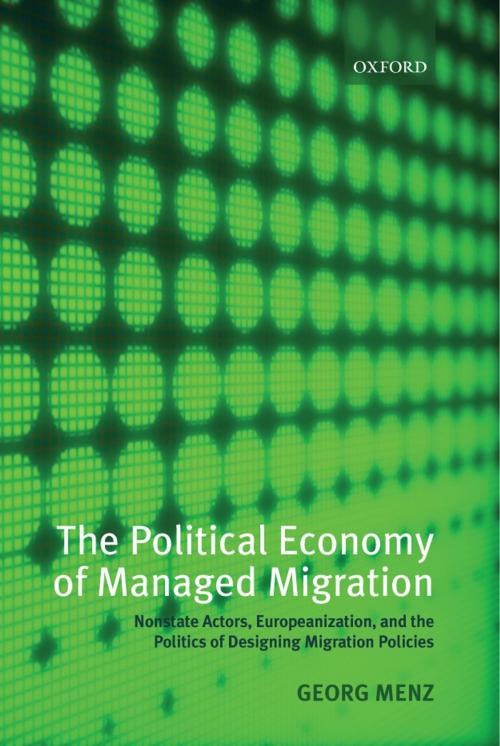The Political Economy of Managed Migration
Nonstate Actors, Europeanization, and the Politics of Designing Migration Policies
Nonfiction, Social & Cultural Studies, Political Science, International, International Relations, Social Science| Author: | Georg Menz | ISBN: | 9780191615641 |
| Publisher: | OUP Oxford | Publication: | December 16, 2010 |
| Imprint: | OUP Oxford | Language: | English |
| Author: | Georg Menz |
| ISBN: | 9780191615641 |
| Publisher: | OUP Oxford |
| Publication: | December 16, 2010 |
| Imprint: | OUP Oxford |
| Language: | English |
European governments have re-discovered labour migration, but are eager to be perceived as controlling unsolicited forms of migration, especially through asylum and family reunion. The emerging paradigm of managed migration combines the construction of more permissive channels for desirable and actively recruited labour migrants with ever more restrictive approaches towards asylum seekers. Non-state actors, especially employer organizations, trade unions, and humanitarian non-governmental organisations, attempt to shape regulatory measures, but their success varies depending on organizational characteristics. Labour market interest associations' lobbying strategies regarding quantities and skill profile of labour migrants will be influenced by the respective system of political economy they are embedded in. Trade unions are generally supportive of well-managed labour recruitment strategies. But migration policy-making also proceeds at the European Union (EU) level. While national actors seek to upload their national model as a blueprint for future EU policy to avoid costly adaptation, top-down Europeanization is re-casting national regulation in important ways, notwithstanding highly divergent national regulatory philosophies. Based on field work in and analysis of primary documents from six European countries (France, Italy, United Kingdom, Ireland, Germany, and Poland) this book makes an important contribution to the study of a rapidly Europeanized policy domain. Combining insights from the literature on comparative political economy, Europeanization, and migration studies, the book makes important contributions to all three, while demonstrating how migration policy can be fruitfully studied by employing tools from mainstream political science, rather than treating it as a distinct subfield.
European governments have re-discovered labour migration, but are eager to be perceived as controlling unsolicited forms of migration, especially through asylum and family reunion. The emerging paradigm of managed migration combines the construction of more permissive channels for desirable and actively recruited labour migrants with ever more restrictive approaches towards asylum seekers. Non-state actors, especially employer organizations, trade unions, and humanitarian non-governmental organisations, attempt to shape regulatory measures, but their success varies depending on organizational characteristics. Labour market interest associations' lobbying strategies regarding quantities and skill profile of labour migrants will be influenced by the respective system of political economy they are embedded in. Trade unions are generally supportive of well-managed labour recruitment strategies. But migration policy-making also proceeds at the European Union (EU) level. While national actors seek to upload their national model as a blueprint for future EU policy to avoid costly adaptation, top-down Europeanization is re-casting national regulation in important ways, notwithstanding highly divergent national regulatory philosophies. Based on field work in and analysis of primary documents from six European countries (France, Italy, United Kingdom, Ireland, Germany, and Poland) this book makes an important contribution to the study of a rapidly Europeanized policy domain. Combining insights from the literature on comparative political economy, Europeanization, and migration studies, the book makes important contributions to all three, while demonstrating how migration policy can be fruitfully studied by employing tools from mainstream political science, rather than treating it as a distinct subfield.















